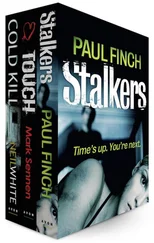Snow crunched under their tyres as they slid to a halt on the mill’s southward-facing lot. The gaunt structure loomed over them against the white winter sky. The red bricks with which it had been constructed were hidden beneath soot so thick it had become scabrous. Those pipes and gutterings that hadn’t already collapsed sagged beneath alpine overhangs of snow. At first glance there was no sign of life, but the place was enormous; not just a central block, which itself might have housed a thousand workers, but also all kinds of annexes and outbuildings. As the van eased forward at a snail’s pace, it dawned on Ernshaw how long it might take them to locate ‘something interesting’ here.
He put his radio to his mouth. ‘1762 to Three?’
‘ Go ahead, Alan .’
‘We’re at Franklyn Road now. Everything looks okay so far. Any further on the complainant, over?’
‘ That’s negative, Alan. Could be some prat with nothing better to do, but probably best to check it out, over .’
‘Received,’ he said, adding under his breath: ‘Might take a while, mind.’
They drove in a wide circle around the aged edifice, their tyres sliding as they hit patches of sheet-ice. Ernshaw wound his window down. It was bitterly cold outside – the snow was still dry and crisp as powder – but even if they didn’t see anything untoward, it was possible they might hear it.
That they didn’t was vaguely disconcerting.
Christmas morning ought to be deeply quiet, restful, hushed by the freshly fallen snow, yet the silence around Kemp’s Mill was somehow uncanny; it had a brittle edge, as if it could shatter at any moment.
They rounded corner after corner, gazing up sheer faces of windows and bricks, networks of ancient piping, and hanging, rusted fire-escapes. The van’s wheels constantly skidded, dirty slush flying out behind. They trundled through an access-passage connecting with a row of empty garages, the corrugated plastic roof of which had fallen through after years of decay. On the other side of this they spotted an entrance.
Rodwell applied the brakes gently, but the van still skated several yards before coming to rest.
What looked like a service doorway was set into a recess at the top of three wide steps. There was no sign of the door itself – possibly it lay under the snow, but from the state of the doorjamb, which had perished to soggy splinters, this entry had been forced a long time ago. A pitch-black interior lay beyond it.
‘2376 to Three?’ Rodwell told his radio.
‘ Go ahead, Keith .’
‘Yeah, we’re still at Kemp’s Mill. Evidence of a break, over.’
‘ Do you want some help? ’
‘That’s negative at present. Looks like an old one.’
They climbed out, gloving up and zipping their padded anoraks. Ernshaw adjusted his hat while Rodwell locked the vehicle. They ventured up the steps, the blackness inside retreating under the intense beams of their torches. At the top, Ernshaw thought he heard something – laughter maybe, but it was very distant and very brief. He glanced at Rodwell, whose dour, pitted face registered that he’d heard nothing. Ernshaw was so unsure himself that he declined to mention it. He glanced behind them. This particular section of the property was enclosed by a high wall. The van was parked close alongside it, the entrance to the garage-passage just at its rear. Aside from the tracks the vehicle itself had made on entering the yard, the snowfall lay unbroken. Of course, flakes had been falling heavily until about two hours ago, so this didn’t necessarily mean that no one had been here during the night.
They entered side-by-side, torchlight spearing ahead, and were immediately faced by three options: directly in front, a switchback stair ascended into opaque blackness; on the right, a passage led off down a long gallery zebra-striped by smudges of light intruding through the ground level windows; on the left lay a wide open area, presumably one of the old workshops. They ventured this way first, their torch-beams crisscrossing, revealing bare brick walls and a high plaster ceiling, much of which had rotted, exposing bone-like girders. Shredded cables hung like jungle creeper. The asphalt floor was scattered with planks and fragments of tiles. Here and there, the corroded stubs of machine fittings jutted dangerously upward. Despite the intense cold, there was a sour taint to the air, like mildew. The scuffling of their feet echoed through the vast building’s distant reaches.
They halted to listen, hearing nothing.
‘This is a wild goose chase,’ Ernshaw finally said, his words smoking. ‘You realise that, don’t you?’
‘Probably,’ Rodwell replied, shining his torch into every corner. From the moment they’d received the call, Rodwell had seemed a little graver of purpose than usual, which was intriguing to Ernshaw. Keith Rodwell had been a copper for so long that he generally sized situations up instinctually. The way he was behaving now suggested that he genuinely believed something untoward was going on here.
‘Okay, I give up,’ Ernshaw said. ‘What do you think we’re going to find?’
‘Keep it down. Even if this is someone taking the piss, let’s catch ’em at it.’
‘Keith … it’s Christmas morning. Why would someone …’
‘Shhh!’
But Ernshaw had also just heard the long, low creak from overhead. They regarded each other in the gloom, ears pricked.
‘Take the front stair,’ Rodwell said quietly, edging across the workshop. ‘I’ll go around the back … see if I can find another way up.’
Ernshaw retreated to the door they’d come in through. He glanced at the van out in the yard; as before, there was no sign of movement. He started to ascend, attempting to do it stealthily though his footsteps rang up the stairwell ahead of him. The first floor he came to comprised another huge workshop. Not all the windows up here were boarded, though their glass was so grimy that only a paltry winter light filtered through. Even so, it was enough to hint at an immense hangar-like space ranging far across the building, filled with stacked crates and workbenches, forested by steel pillars.
Ernshaw hesitated, gripping the hilt of his baton. This time last year he’d been an innocent young student at the University of Hull, so he had no trouble admitting to himself that, while it was bad enough being made to work on Christmas Day – only the older, married guys tended to be spared that pain-in-the-arse duty – it was even worse having to spend it trawling through the guts of an eerie, frozen ruin like this.
A loud crackle from his radio made him jump.
The voice of Comms boomed out as it dispatched messages to patrols elsewhere on the subdivision. Irritated, he turned the volume down.
Ernshaw advanced as his eyes adjusted to the half-light. Directly ahead, about forty yards away, a doorway opened into what looked like an antechamber. For some reason, the rear brick wall of that chamber was lit by a greenish glow.
Green?
A coloured candle, maybe? A paper lantern?
Ernshaw halted as a figure flitted past the doorway on the other side.
‘Hey,’ he said under his breath. Then louder: ‘ Hey! ’
He dashed forward, with baton drawn and angled across his shoulder.
When he entered the chamber, nobody was there, but he saw that the odd-coloured light had been caused by a sheet of mouldy green canvas fastened over a window. A stairway – an indoor fire-escape, all rust and riveted steel – dropped down through a trapdoor; while a secondary stair rose up to the next level, though this was very narrow, scarcely broad enough for an average-sized man to climb it without turning sideways. He peered up, spying a ray of feeble daylight at the top. When he listened, he heard nothing, though it wasn’t difficult to imagine that someone was lurking up there, listening back.
Читать дальше
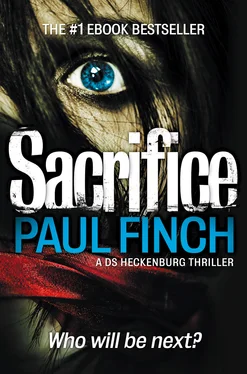
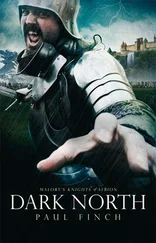
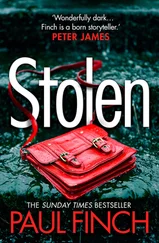
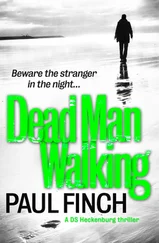
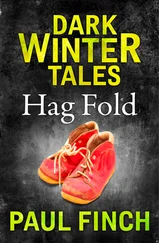
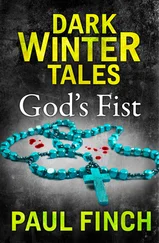
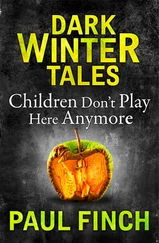
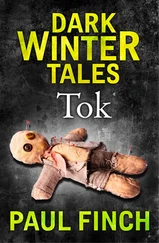
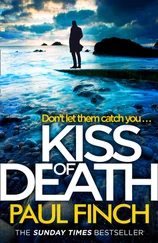
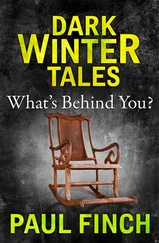

![Paul Finch - A Wanted Man [A PC Heckenburg Short Story]](/books/702381/paul-finch-a-wanted-man-a-pc-heckenburg-short-sto-thumb.webp)
